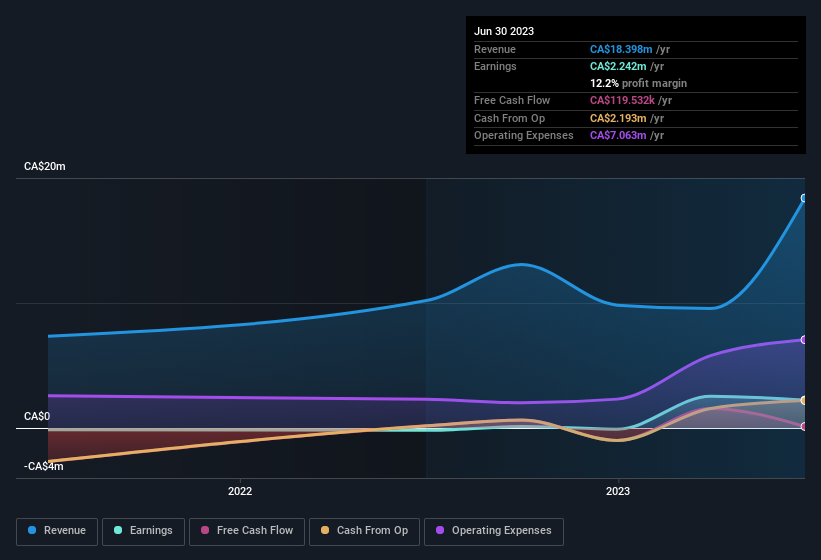- Canada
- /
- Construction
- /
- NEOE:SUNN
Statutory Profit Doesn't Reflect How Good SolarBank's (CSE:SUNN) Earnings Are
Even though SolarBank Corporation's (CSE:SUNN) recent earnings release was robust, the market didn't seem to notice. Investors are probably missing some underlying factors which are encouraging for the future of the company.
View our latest analysis for SolarBank

Zooming In On SolarBank's Earnings
In high finance, the key ratio used to measure how well a company converts reported profits into free cash flow (FCF) is the accrual ratio (from cashflow). To get the accrual ratio we first subtract FCF from profit for a period, and then divide that number by the average operating assets for the period. You could think of the accrual ratio from cashflow as the 'non-FCF profit ratio'.
As a result, a negative accrual ratio is a positive for the company, and a positive accrual ratio is a negative. While it's not a problem to have a positive accrual ratio, indicating a certain level of non-cash profits, a high accrual ratio is arguably a bad thing, because it indicates paper profits are not matched by cash flow. To quote a 2014 paper by Lewellen and Resutek, "firms with higher accruals tend to be less profitable in the future".
SolarBank has an accrual ratio of 0.27 for the year to June 2023. We can therefore deduce that its free cash flow fell well short of covering its statutory profit. In fact, it had free cash flow of CA$120k in the last year, which was a lot less than its statutory profit of CA$2.24m. SolarBank shareholders will no doubt be hoping that its free cash flow bounces back next year, since it was down over the last twelve months. However, that's not all there is to consider. The accrual ratio is reflecting the impact of unusual items on statutory profit, at least in part. The good news for shareholders is that SolarBank's accrual ratio was much better last year, so this year's poor reading might simply be a case of a short term mismatch between profit and FCF. Shareholders should look for improved cashflow relative to profit in the current year, if that is indeed the case.
That might leave you wondering what analysts are forecasting in terms of future profitability. Luckily, you can click here to see an interactive graph depicting future profitability, based on their estimates.
The Impact Of Unusual Items On Profit
Unfortunately (in the short term) SolarBank saw its profit reduced by unusual items worth CA$724k. In the case where this was a non-cash charge it would have made it easier to have high cash conversion, so it's surprising that the accrual ratio tells a different story. While deductions due to unusual items are disappointing in the first instance, there is a silver lining. When we analysed the vast majority of listed companies worldwide, we found that significant unusual items are often not repeated. And that's hardly a surprise given these line items are considered unusual. If SolarBank doesn't see those unusual expenses repeat, then all else being equal we'd expect its profit to increase over the coming year.
Our Take On SolarBank's Profit Performance
In conclusion, SolarBank's accrual ratio suggests that its statutory earnings are not backed by cash flow, even though unusual items weighed on profit. Given the contrasting considerations, we don't have a strong view as to whether SolarBank's profits are an apt reflection of its underlying potential for profit. So if you'd like to dive deeper into this stock, it's crucial to consider any risks it's facing. In terms of investment risks, we've identified 1 warning sign with SolarBank, and understanding it should be part of your investment process.
In this article we've looked at a number of factors that can impair the utility of profit numbers, as a guide to a business. But there is always more to discover if you are capable of focussing your mind on minutiae. Some people consider a high return on equity to be a good sign of a quality business. So you may wish to see this free collection of companies boasting high return on equity, or this list of stocks that insiders are buying.
New: Manage All Your Stock Portfolios in One Place
We've created the ultimate portfolio companion for stock investors, and it's free.
• Connect an unlimited number of Portfolios and see your total in one currency
• Be alerted to new Warning Signs or Risks via email or mobile
• Track the Fair Value of your stocks
Have feedback on this article? Concerned about the content? Get in touch with us directly. Alternatively, email editorial-team (at) simplywallst.com.
This article by Simply Wall St is general in nature. We provide commentary based on historical data and analyst forecasts only using an unbiased methodology and our articles are not intended to be financial advice. It does not constitute a recommendation to buy or sell any stock, and does not take account of your objectives, or your financial situation. We aim to bring you long-term focused analysis driven by fundamental data. Note that our analysis may not factor in the latest price-sensitive company announcements or qualitative material. Simply Wall St has no position in any stocks mentioned.
About NEOE:SUNN
PowerBank
Operates as an independent renewable and clean energy project developer, power producer, and asset operator in Canada and the United States.
High growth potential with moderate risk.
Similar Companies
Market Insights
Community Narratives



